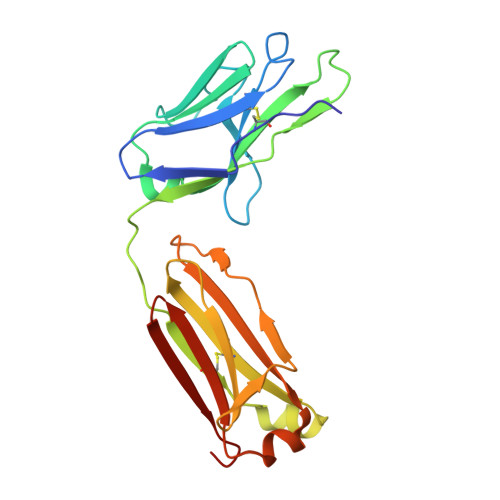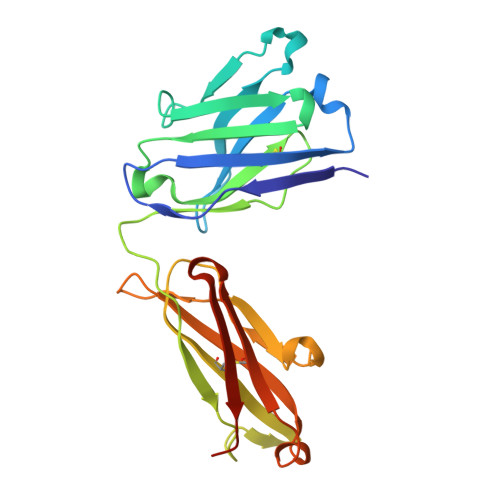Development of an aggregate-selective, human-derived alpha-synuclein antibody BIIB054 that ameliorates disease phenotypes in Parkinson's disease models.
Weihofen, A., Liu, Y., Arndt, J.W., Huy, C., Quan, C., Smith, B.A., Baeriswyl, J.L., Cavegn, N., Senn, L., Su, L., Marsh, G., Auluck, P.K., Montrasio, F., Nitsch, R.M., Hirst, W.D., Cedarbaum, J.M., Pepinsky, R.B., Grimm, J., Weinreb, P.H.(2018) Neurobiol Dis 124: 276-288
- PubMed: 30381260
- DOI: https://doi.org/10.1016/j.nbd.2018.10.016
- Primary Citation of Related Structures:
6CT7 - PubMed Abstract:
Aggregation of α-synuclein (α-syn) is neuropathologically and genetically linked to Parkinson's disease (PD). Since stereotypic cell-to-cell spreading of α-syn pathology is believed to contribute to disease progression, immunotherapy with antibodies directed against α-syn is considered a promising therapeutic approach for slowing disease progression. Here we report the identification, binding characteristics, and efficacy in PD mouse models of the human-derived α-syn antibody BIIB054, which is currently under investigation in a Phase 2 clinical trial for PD. BIIB054 was generated by screening human memory B-cell libraries from healthy elderly individuals. Epitope mapping studies conducted using peptide scanning, X-ray crystallography, and mutagenesis show that BIIB054 binds to α-syn residues 1-10. BIIB054 is highly selective for aggregated forms of α-syn with at least an 800-fold higher apparent affinity for fibrillar versus monomeric recombinant α-syn and a strong preference for human PD brain tissue. BIIB054 discriminates between monomers and oligomeric/fibrillar forms of α-syn based on high avidity for aggregates, driven by weak monovalent affinity and fast binding kinetics. In efficacy studies in three different mouse models with intracerebrally inoculated preformed α-syn fibrils, BIIB054 treatment attenuated the spreading of α-syn pathology, rescued motor impairments, and reduced the loss of dopamine transporter density in dopaminergic terminals in striatum. The preclinical data reported here provide a compelling rationale for clinical development of BIIB054 for the treatment and prevention of PD.
Organizational Affiliation:
Biogen, 225 Binney Street, Cambridge, MA 02142, USA; Neurimmune AG, Wagistrasse 13, 8952 Schlieren, Switzerland. Electronic address: andreas.weihofen@biogen.com.

















